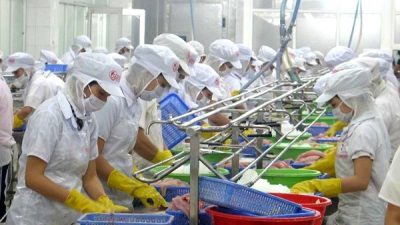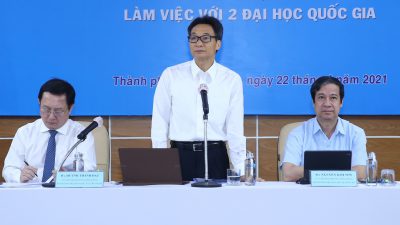
|
A total of 892,454 people in Vietnam have been given COVID-19 vaccine shots to date, according to May 11’s morning report from the National Expanded Programme on Immunisation (NEPI). |
|
On May 10, 25,057 people in 41 cities and provinces have been given the jabs. The doses administered has reached 97 percent of the existing stock of 917,000 doses of AstraZeneca that Vietnam has received so far as part of the purchase of 30 million doses from the company and another 30 million from the global vaccine sharing scheme COVAX Facility that is expected to be delivered in different batches within 2021 and early 2022. The first in line are mostly frontline workers – medical staff directly involved with the treatment of COVID-19 patient; medical staff performing tasks such as collecting patient samples, testing and tracing; members of grassroots anti-COVID-19 groups; members of COVID-19 steering committees at local and central levels; and police and military members. Regarding last week’s death of a medical worker in Vietnam who developed anaphylactic shock after receiving the COVID-19 shot, health authorities have stressed that the reaction rate is still too small to forego the critical protection that the vaccines offer against COVID-19. Pham Quang Thai, head of the northern region office of the NEPI, said all vaccines, drugs, and even food – not just COVID-19 vaccines – could lead to adverse reactions, but the rate is “very low” and if the vaccinated are monitored and reactions are promptly dealt with then there would be few problems. “We are pained to hear about the incident. It was very rare, and we won’t pause (the vaccination drive) here but we should learn from the experience here to prevent such regrettable incidents in the future,” Thai said. Specifically, there must be increased readiness for the prevention of anaphylaxis at all immunisation facilities, according to the doctor. Adrenalin shots must be readily available so that they could be immediately administered, instead of wasting critical time in preparing the shots, he said, adding that training and supervision of follow-up post-vaccination monitoring should also be strengthened to ensure that medical staff are ready in all situations. Given the currently limited supply to Vietnam, especially as the COVID-19 situation is showing complicated developments, the health ministry has met with a World Health Organization (WHO) representative to facilitate the negotiations on transferring of mRNA technology – currently the cutting-edge technology used in highly effective COVID-19 vaccines like Pfizer-BioNTech and Moderna (while AstraZeneca used vector-based technology) – so that Vietnam can start producing the vaccines right within the country. The health ministry is awaiting the results of the second phase of the human trials of Nanogen, Vietnam’s front runner in the race for a homegrown COVID-19 vaccine, and depending on the safety assessment, could start administering the vaccine to the population as the phase 3 trials commence. Source: Nhan Dan Online |

